AMD Zen 3 Ryzen Deep Dive Review: 5950X, 5900X, 5800X and 5600X Tested
by Dr. Ian Cutress on November 5, 2020 9:01 AM ESTCPU Tests: Synthetic
Most of the people in our industry have a love/hate relationship when it comes to synthetic tests. On the one hand, they’re often good for quick summaries of performance and are easy to use, but most of the time the tests aren’t related to any real software. Synthetic tests are often very good at burrowing down to a specific set of instructions and maximizing the performance out of those. Due to requests from a number of our readers, we have the following synthetic tests.
Linux OpenSSL Speed: SHA256
One of our readers reached out in early 2020 and stated that he was interested in looking at OpenSSL hashing rates in Linux. Luckily OpenSSL in Linux has a function called ‘speed’ that allows the user to determine how fast the system is for any given hashing algorithm, as well as signing and verifying messages.
OpenSSL offers a lot of algorithms to choose from, and based on a quick Twitter poll, we narrowed it down to the following:
- rsa2048 sign and rsa2048 verify
- sha256 at 8K block size
- md5 at 8K block size
For each of these tests, we run them in single thread and multithreaded mode. All the graphs are in our benchmark database, Bench, and we use the sha256 and md5 results in published reviews.




GeekBench 5: Link
As a common tool for cross-platform testing between mobile, PC, and Mac, GeekBench is an ultimate exercise in synthetic testing across a range of algorithms looking for peak throughput. Tests include encryption, compression, fast Fourier transform, memory operations, n-body physics, matrix operations, histogram manipulation, and HTML parsing.
I’m including this test due to popular demand, although the results do come across as overly synthetic, and a lot of users often put a lot of weight behind the test due to the fact that it is compiled across different platforms (although with different compilers).
We have both GB5 and GB4 results in our benchmark database. GB5 was introduced to our test suite after already having tested ~25 CPUs, and so the results are a little sporadic by comparison. These spots will be filled in when we retest any of the CPUs.












339 Comments
View All Comments
Qasar - Tuesday, November 10, 2020 - link
simple. if intel/nvidia does it, its ok, and accepted. but if amd does it ? its a crime, and becomes important.TheinsanegamerN - Thursday, November 12, 2020 - link
The leectrical costs from running intel VS amd add up to literal cents per month. If you are that concerned....you shouldnt be buying $500 CPUs.Cost of ownership really only matters, similarly, on cheap low end cars. People buying $100K+ mercedes are not particularly concerned about the price of parts or fuel, if they were they wouldnt be buying a $100K car.
Threska - Monday, November 16, 2020 - link
Funny thing my APC UPS keeps track of something like that for things plugged it. Only thing that demonstrates is that everything costs, even FUN.Spunjji - Sunday, November 8, 2020 - link
Only if you totally ignore performance per watt... You need a cooler capable of dissipating up to 250W to hit that performance, and even then, your characterisation here is garbage. Overall the 5800X is a superior product for the same price, and it's only just been released.Let the shitty, bitter takes continue!
Gigaplex - Thursday, November 5, 2020 - link
And when Intel held the performance crown, they priced their parts higher than the competition. This is to be expected. AMD only undercut on price because they couldn't compete on performance previously.LithiumFirefly - Friday, November 6, 2020 - link
They didn't just price their parts higher for nearly 25 years they just slapped $1,000 price tag on their top chip didn't matter what its performance was $1,000 that's what it was.just4U - Thursday, November 5, 2020 - link
the 5900X is nice at it's price point @ only 3-10 bucks more than the 10900K which appears to be what it's competing with.. and all the 10core parts really. The 5800X is in a odd position.. and I doubt it's going to be all that popular at that price point.Spunjji - Sunday, November 8, 2020 - link
5600 and 5700 non-X will be where it's at for value when they roll around.just4U - Monday, November 9, 2020 - link
Yeah I agree.. plus it's likely that prices will come down on these parts somewhat or be offered on sale or bundled..(saw a bit of that on launch day but they all sold out so whatever)bananaforscale - Monday, November 9, 2020 - link
"Value destroying price hike"? Sure for 3600 vs 5600X (which is *arguably* comparable), 3900X vs 5900X there's no contest. 5900X is demonstrably more than 10% faster is most cases. FWIW, I'd go for the 5800X over 10900K performance being equal because PCIe 4 and lower power draw.